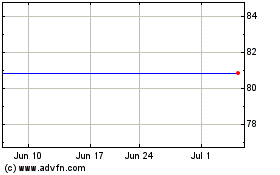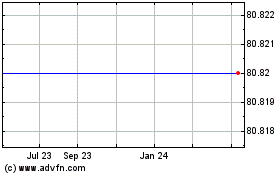St. Jude Medical Announces FDA Approval of Current Plus ICD & Promote Plus CRT-D Devices to Provide Therapy for Life-Threaten...
May 11 2009 - 8:00AM
Business Wire
St. Jude Medical, Inc. (NYSE:STJ) today announced U.S. Food and
Drug Administration (FDA) approval of the Promote� Plus cardiac
resynchronization therapy defibrillator (CRT-D) and Current� Plus
implantable cardioverter defibrillators (ICDs), designed with
TailoredTherapy� features that give physicians more options for
customizing therapy for patients with potentially lethal heart
arrhythmias and heart failure.
�There is no �text book� patient. Each person presents a unique
anatomy, disease state and response to therapy,� said Eric S. Fain,
M.D., president of the St. Jude Medical Cardiac Rhythm Management
Division. �With the feature set available in the Promote Plus and
Current Plus devices, physicians can customize programming to
ensure each patient is receiving therapy that is appropriate for
his or her individual condition.�
The Promote Plus CRT-D and Current Plus ICDs also offer a
smoother header configuration designed to offer better patient
comfort and improve visibility at the connector site, where the
thin wire (called a lead) that delivers the electricity from the
device to the heart is connected.
To better assist physicians in accurately diagnosing and
managing patients with fast rates in the heart�s upper chambers
(atria), the Promote Plus CRT-D and Current Plus ICDs also include
a new atrial tachycardia/atrial fibrillation (AT/AF) Alert feature.
This feature is designed to notify physicians when a rapid atrial
rate exceeds a programmed value and occurs over an extended time
period. These devices can also be programmed to notify the patient
through a unique vibratory alert that has been clinically proven
more effective than audible alerts.1 Additionally, the devices have
the ability to inform the patient�s clinic through the St. Jude
Medical Merlin@home� transmitter and Merlin.net� Patient Care
Network (PCN). These features allow the physician to better manage
patients� atrial arrhythmias, such as AF.
The Promote Plus CRT-D and Current Plus ICDs are built on the
St. Jude Medical consolidated hardware and software �Unity� device
platform and include the company�s advanced safety features and
algorithms for better patient management. These include improved
lead monitoring capabilities � including daily checks of all pacing
and shock configurations � that provide added patient safety.
TailoredTherapy features in these devices include:
- QuickOpt� timing cycle
optimization - a programmer-based optimization method that is
proprietary to St. Jude Medical that is used with CRT-Ds, CRT-Ps
(cardiac resynchronization therapy pacemakers) and ICDs to help
physicians quickly program the device's timing cycles � in about 90
seconds - to help deliver optimal therapy to patients
- DeFT Response� technology -
designed to help devices meet the needs of patients with high or
varying defibrillation thresholds, helping physicians to ensure
appropriate delivery of life-saving therapy
- VIP� (Ventricular Intrinsic
Preference) algorithm - provides a delay in device stimulation of
the lower chambers of the heart (ventricles) to allow the patient's
own heart rhythm to prevail when possible. The VIP technology is
designed to provide device stimulation only when needed, which has
been shown to be better for patients' overall heart health.
- SenseAbility� technology -
designed to enable physicians to program the device to more
accurately sense abnormal heart rhythms, thereby protecting the
patient from receiving inappropriate shocks
An ICD is a small device implanted in the chest to treat
potentially lethal, abnormally fast heart rhythms (ventricular
tachycardias or ventricular fibrillation), which often lead to
sudden cardiac death (SCD). Nearly 1,000 people every day and more
than 350,000 every year in the U.S. die from SCD. An ICD delivers
potentially life-saving therapy from the device to the patient's
heart through an insulated wire or lead.
Cardiac resynchronization therapy - delivered in an ICD or a
pacemaker - resynchronizes the beating of the heart's lower
chambers (ventricles), which often beat out of sync in heart
failure patients. Studies have shown that CRT can improve the
quality of life for many patients with heart failure, a progressive
condition in which the heart weakens and loses its ability to pump
an adequate supply of blood. About 5 million Americans suffer from
heart failure, with 550,000 new cases diagnosed every year,
according to the American Heart Association.
About St. Jude Medical
St. Jude Medical develops medical technology and services that
focus on putting more control into the hands of those who treat
cardiac, neurological and chronic pain patients worldwide. The
company is dedicated to advancing the practice of medicine by
reducing risk wherever possible and contributing to successful
outcomes for every patient. Headquartered in St. Paul, Minn., St.
Jude Medical employs approximately 14,000 people worldwide and has
four major focus areas that include: cardiac rhythm management,
atrial fibrillation, cardiovascular and neuromodulation. For more
information, please visit www.sjm.com.
Forward-Looking Statements
This news release contains forward-looking statements within the
meaning of the Private Securities Litigation Reform Act of 1995
that involve risks and uncertainties. Such forward-looking
statements include the expectations, plans and prospects for the
Company, including potential clinical successes, anticipated
regulatory approvals and future product launches, and projected
revenues, margins, earnings and market shares. The statements made
by the Company are based upon management�s current expectations and
are subject to certain risks and uncertainties that could cause
actual results to differ materially from those described in the
forward-looking statements. These risks and uncertainties include
market conditions and other factors beyond the Company�s control
and the risk factors and other cautionary statements described in
the Company�s filings with the SEC, including those described in
the Risk Factors and Cautionary Statements sections of the
Company�s Annual Report on Form 10-K for the fiscal year ended
January 3, 2009 and Quarterly Report on Form 10-Q for the fiscal
quarter ended April 4, 2009.�The Company does not intend to update
these statements and undertakes no duty to any person to provide
any such update under any circumstance.
1 Bennett MT et al. The ICD patient alert is potentially an
unreliable ICD warning feature. Presented at the Canadian
Cardiovascular Congress, Toronto, Ontario, October 26, 2008.
SJM (NYSE:STJ)
Historical Stock Chart
From Jun 2024 to Jul 2024

SJM (NYSE:STJ)
Historical Stock Chart
From Jul 2023 to Jul 2024
